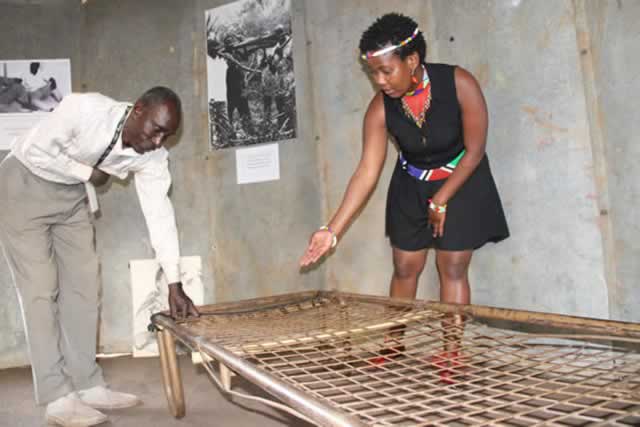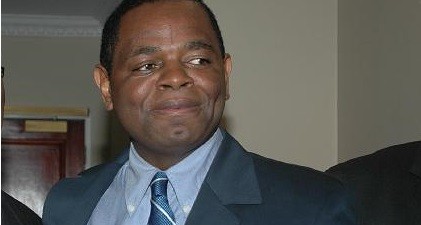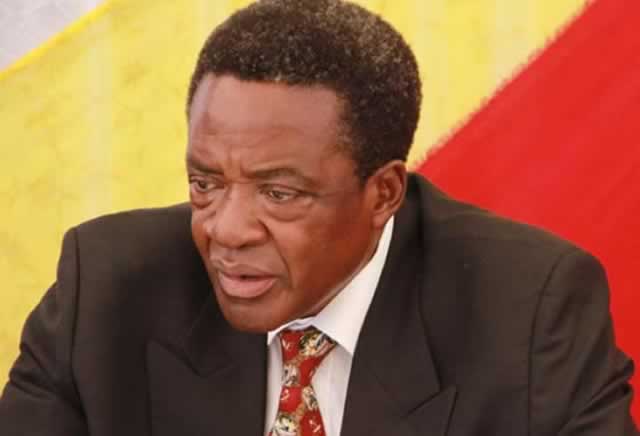Efforts under way to declare Gonakudzingwa national monument


Chief executive of friends of Joshua Nkomo Trust Beverly Pullen shows Christopher Ndlovu the bed that the late Joshua Nkomo used to sleep on at Gonakudzingwa Prison in 1964-1974
Prosper Ndlovu, recently at Gonakudzingwa
A solemn atmosphere engulfed what remains of Gonakudzingwa Detention Camp in Masvingo province on Saturday when a group of surviving ex-political detainees visited the site to narrate their political life story and how they survived the brutality of the colonial regime.
It was a touching moment to witness some of the ex-detainees drawn from the country’s 10 provinces exchanging greetings after years of separation, with Cde Moses Mapingire from the Midlands weeping as he greeted colleague, Cde Jane Lungile Ngwenya from Bulawayo. The delegation, which comprised former Zapu cadres, officials from the National Museums and Monuments of Zimbabwe (NMMZ), journalists, college students and historians, arrived at the now desolate “restriction” camp at around 11am.
The camp, which is situated in Gonarezhou National Park about 150km off the Masvingo-Beitbridge Highway at the border with Mozambique, was used by the Ian Smith government to incarcerate nationalists from Zapu during the liberation struggle.
A majority of the ex-detainees have grown old and some of themcan hardly walk without assistance.
Speaking during the tour, the nationalists said although they were happy to reunite, visiting the site evoked memories of gloom as they remembered how the colonial government tormented them for demanding their freedom.
“They brought us here with the hope that we will be devoured by lions and other wild animals. They tormented us for demanding our freedom. I hated the whites because they harassed my parents,” said Cde Ngwenya (78), the only surviving female detainee at the camp, situated near Sango Border Post.
Cde Zipa Ncube from Bubi District in Matabeleland North province said visiting the camp reminded him of the hardships that nationalists went through during the war. “Smith thought by harassing and incarcerating us in prison and detention we were going to give up. Instead we fought back and conquered him. We have majority rule now,” said Cde Ncube.
Cde Million Ngwenya from Matabeleland South said he was pained by the fact that some of the cadres who went through settler brutality had since rebelled from the revolutionary path.
Cde Samuel Mpofu from Bulawayo, who was putting on the famous animal skin hat, which was worn by most Zapu cadres, said the days of detention were the most painful in his life but said revolutionary cadres always engaged in activities that kept them cheerful and focused towards gaining independence.
Cde Mapingire said he was happy to meet his old friends and recalled how the Rhodesian forces at one time attempted to kill Cde Ngwenya.
Cde Killion Bhebhe from Mashonaland West said during their days at the camp the late Vice-President Joshua Nkomo, who led Zapu, used to address public meetings, which were attended by scores of visitors who would have come to meet their relatives.
“Those were the days of oneness and unity of purpose. We called ourselves umntwana wenhlabathi/mwana wevhu,” said Cde Reuben Marinda from Gutu in Masvingo.
Cde Daniel Simango, who was VP Nkomo’s private messenger, explained how he used to dig up information under disguise and disclose secrets about the operations of the colonial regime.
For Cde Joseph Kapeta from Rusape in Manicaland, the camp should be spruced up and developed into a modern institution where everybody would learn about the liberation history of the country.
The delegation was able to visit camps one and five and could only observe cement slabs and concrete of the structures which housed the incarcerated nationalists. Also on site were the barbed wire and some iron poles that were used to deter detainees from escaping.
The other camps are inaccessible because they were encircled by anti-personnel landmines, most of which remain underground and active.
The ex-detainees urged the Government to preserve the site and develop it for the benefit of future generations. NMMZ southern region director, Mr Lovemore Mandima said efforts were underway to declare the camp a national monument and said engagements were in progress to first of all clear the area of landmines.
Several senior Zapu leaders such as the late VP Nkomo, Joseph Msika, Josiah Chinamano and his wife, Ruth, Daniel Madzimbamuto, Stanslaus Marembo and Willie Musarurwa were some of the prominent cadres detained at Gonakudzingwa Detention Camp. Other Zapu members were detained at WhaWha detention camp in Gweru.
Zanu cadres were also not spared of the brutality as they were detained at Sikombela Detention Camp in Gokwe, which has since been declared a national monument.











Comments